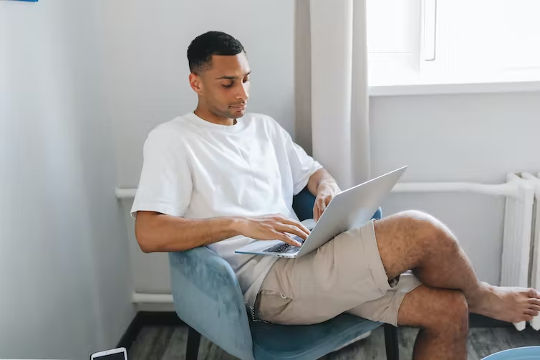
Sitting with legs crossed for prolonged periods may have negative health effects, expert warns. Polina Tankilevitch/Shutterstock
Are you sitting comfortably? Just pause for a moment and without adjusting, notice your posture. What are your legs doing? Are they crossed? And are you a right or left crosser? Some 62% of people cross right over left, 26% go the other way and 12% have no preference.
There are typically two ways to sit in a chair and cross your legs, one is at the knee and the other is at the ankle. But as comfy as it may be to sit with your legs crossed, is it bad for your health and posture? Let’s take a look at the evidence.
For a start, research shows that sitting cross-legged can increase the misalignment of the hips, with one being higher than the other.
And it changes the speed at which blood moves through the blood vessels in the lower limbs, which can increase the risk of blood clots.
Get The Latest By Email
Most of the research suggests crossing at the knees is worse than the ankles. Indeed, sitting this way can cause an increase in your blood pressure due to the pooling of blood in the veins and your heart having to work against this. And this can increase the risk of damage to your blood vessels, which is why when you get your blood pressure taken you should have your feet flat on the floor.
Effect on the body
The longer and more often you sit cross-legged, the more likely it is that you’ll have long-term changes in the muscle lengths and bone arrangements in your pelvis. And due to the way your skeleton is linked together, leg crossing can also cause misalignment of the spine and shoulders.
Your head position can potentially become out of alignment due to changes in the bones of the neck, as the spine compensates to keep your centre of gravity above the pelvis.
Your neck can also be affected due to one side of the body being weaker than the other. The same imbalance can be seen in the muscles of the pelvis and lower back as a result of poor posture and stresses and strains caused by sitting cross-legged.
The pelvis may also become misaligned due to the prolonged stretching of the gluteal (bum) muscles on one side, meaning that they become weaker.
Sitting with the legs crossed for a long time increases the likelihood of scoliosis (abnormal alignment of the spine) and other deformities. It can also cause greater trochanteric pain syndrome, a common and painful condition that affects the outer side of the hip and thigh.
Research also shows that sitting with legs crossed can put the peroneal nerve, also known as the fibular nerve, in your lower leg at risk of compression and injury. This typically manifests as a weakness when trying to lift the little-toe side of the foot as well as the more concerning foot drop – where the whole of the foot hangs down. Though in most cases, this is short-lived and returns to normal within a few minutes.
There’s also evidence that crossing the legs could affect sperm production. This is because the temperature of the testicles needs to be between 2°C and 6°C below standard body temperature. Being seated increases the temperature of the testicles by 2°C and crossing your legs can increase the temperature of the testes by as much as 3.5°C. And studies suggest that an increase in scrotum or testicle temperature can reduce both sperm count and quality.
It’s also worth noting that due to differences in the anatomy of men and women it’s probably much easier for women to sit cross-legged – particularly because men have a reduced range of motion at the hip.
Legs and joints
But research does indicate that sitting with legs crossed can be beneficial for some people. One small study from 2016, for example, found that for people who have one leg longer than the other, sitting crossed-legged can help to adjust the height of the two sides of the pelvis, improving alignment.
Sitting with legs crossed also appears to reduce the activity of some muscles, particularly the oblique muscles (those beneath the skin where you put your hands on your hips) compared to sitting with legs forward. This may help relax your core muscles and prevent over-exertion.

But what about the lotus position? Pexels/Rfstudio
Similarly, there is evidence that sitting cross-legged improves the stability of the sacroiliac joints (responsible for transferring weight between the spine and legs).
And of course, the famous yoga or meditation pose (lotus position) sees people sitting on the floor with legs crossed. Though there is limited data as to whether long periods of time spent in this position may lead to some of the issues that sitting cross-legged in a chair causes. Indeed, for many people yoga offers huge benefits – even those who already have knee issues.
So the verdict? It’s probably better to avoid crossing your legs if you can. Though that said, many of the risk factors associated with crossing your legs are likely exacerbated by other underlying issues such as sedentary lifestyles and obesity. So with this in mind, the main advice is to not sit still in the same position for too long and to keep regularly active.![]()
About The Author
Adam Taylor, Professor and Director of the Clinical Anatomy Learning Centre, Lancaster University
This article is republished from The Conversation under a Creative Commons license. Read the original article.
books_fitness










